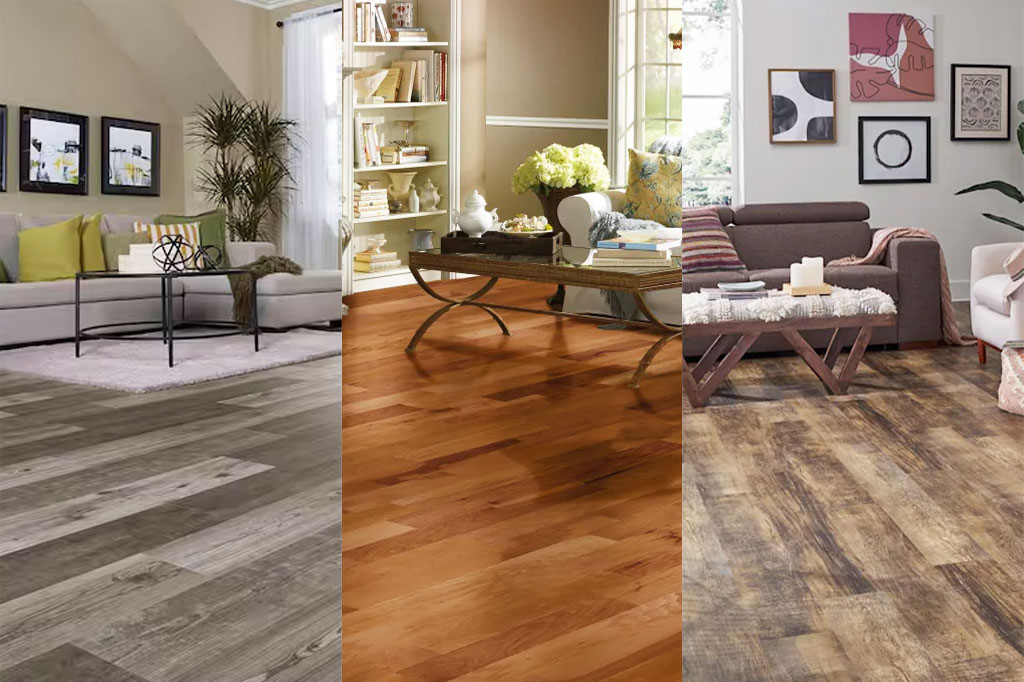Choosing the right flooring is vital for home renovations, impacting both aesthetics and durability. Homeowners often weigh the options between laminate, engineered hardwood, and vinyl plank, each offering unique advantages and challenges in terms of durability and overall performance.
Understanding the durability of different flooring options is essential, particularly for areas of high traffic or varying environmental conditions. This comparison delves into which type is most resilient across various living environments.
Table of Contents
ToggleLaminate Wood Flooring
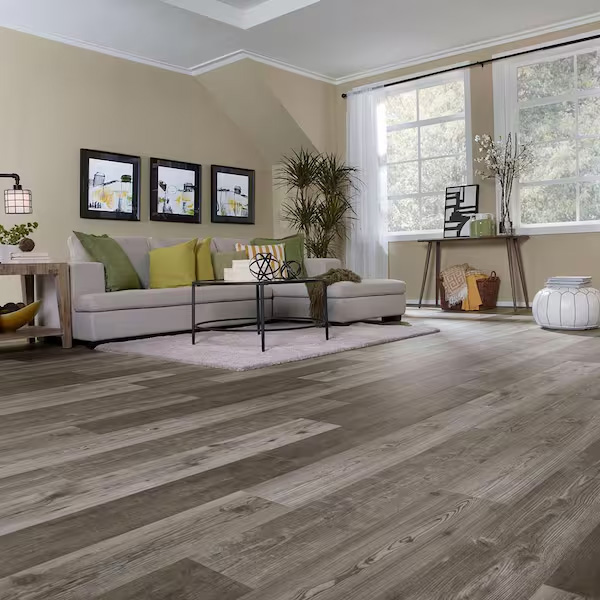
Structure and Composition: Lamination is a technique that fuses many layers together to create laminate flooring. Typically, the layers consist of a clear protective wear layer that deters damage and scratches, a photographic appliqué layer that replicates the look of stone or wood, and a high-density fiberboard (HDF) core. Additional stability and moisture resistance are provided by the backing, which is the bottom layer.
Common Uses and Applications: Laminate flooring is commonly used in residential settings such as living rooms, bedrooms, and hallways due to its affordability, durability, and wide range of styles. It’s also suitable for light commercial applications but may not be ideal for areas with high moisture or heavy foot traffic.
Pros | Cons |
|
|
Engineered Hardwood Flooring
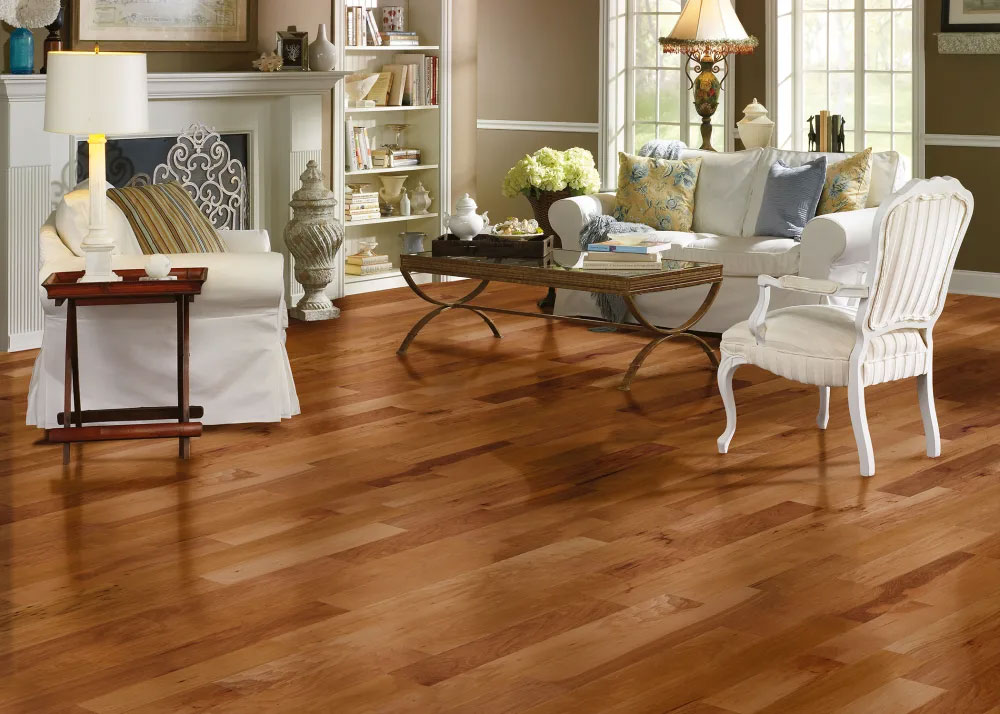
Structure and Composition: Engineered hardwood flooring is made out of several layers of plywood or high-density fiberboard (HDF) core sandwiched between a real hardwood veneer layer.
The top layer is made from genuine hardwood, providing the same aesthetic appeal as solid wood flooring, while the underlying layers add stability and resistance to changes in humidity and temperature.
Common Uses and Applications: Engineered hardwood flooring is versatile and can be used in almost any room, including basements and kitchens, where solid hardwood may not be suitable due to moisture concerns. Because it provides the stability of enhanced wood beauty, it is a popular option for both home and business areas.
Pros | Cons |
|
|
Vinyl Plank Flooring
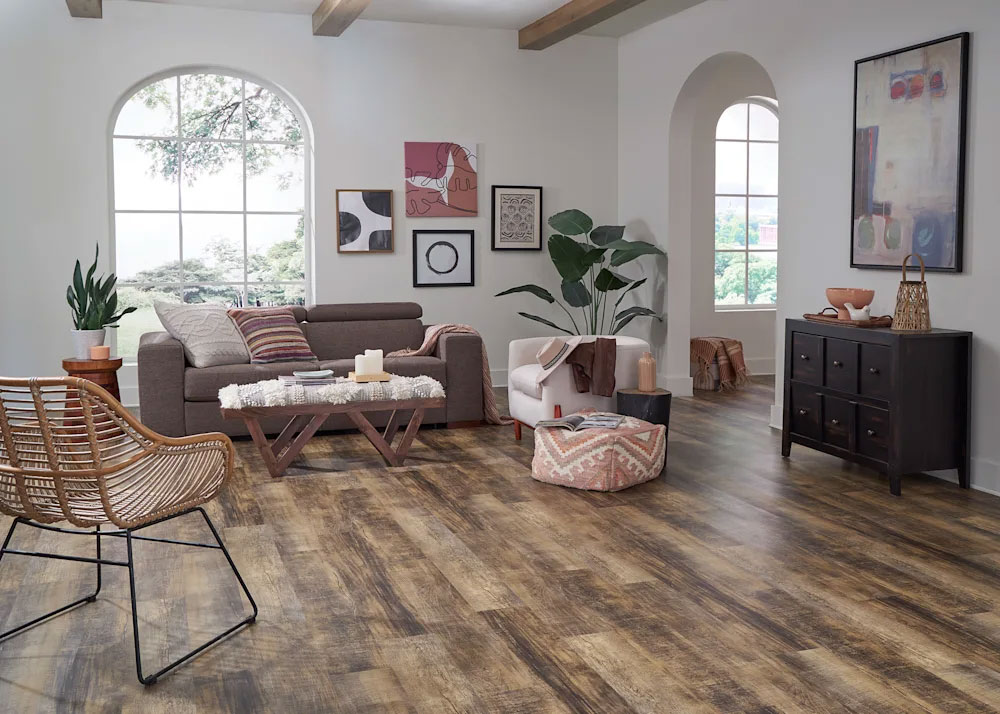
Composition and Structure: Vinyl plank flooring is composed of several layers, including a rigid or flexible core, a printed design layer that replicates the look of wood or stone, and a transparent wear layer that protects against scratches, stains, and moisture.
Common Uses and Applications: Because vinyl plank flooring is so water resistant, it may be used in a lot of different types of locations, such as basements, kitchens, and bathrooms. It is a sensible option for both commercial and residential applications because of its low maintenance requirements and longevity, especially in high-traffic areas.
Pros | Cons |
|
|
Durability Factors
Key Durability Metrics
- Wear and Tear Resistance
- Water and Moisture Resistance
- Scratch and Dent Resistance
- Maintenance and Longevity
Laminate Flooring
- Wear and Tear Resistance:Tough outer layer resists scratches, scuffs, and impacts; suitable for high-traffic areas.
- Wetness and Humidity Resistance: Moderate,not waterproof; avoid submerging in water for extended periods of time; not advised for use in basements or bathrooms.
- Scratch and Dent Resistance:Good resistance; susceptible to damage from heavy or sharp objects; difficult to repair if damaged.
- Maintenance and Longevity:Low maintenance; requires regular sweeping and occasional mopping; lasts 15-25 years with proper care; lifespan may be shorter in high-traffic areas.
Engineered Hardwood Flooring
- Wear and Tear Resistance: Moderate to high; depends on veneer thickness and finish quality; handles foot traffic well; top layer may wear down over time.
- Water and Moisture Resistance: More resistant than solid hardwood; not waterproof; protects from excessive moisture to prevent warping or damage.
- Scratch and Dent Resistance: More resistant than solid hardwood; still vulnerable to heavy furniture, pet claws, or high heels; some finishes offer extra scratch resistance.
- Maintenance and Longevity: Regular sweeping and occasional damp mopping; can be refinished once or twice; lifespan of 20-30 years or more with proper care.
Vinyl Plank Flooring
- Wear and Tear Resistance: Highly resistant; durable wear layer withstands heavy foot traffic; suitable for residential and commercial use.
- Water and Moisture Resistance: Completely watertight, impermeable to water, and resistant to warping or swelling, making it perfect for humid spaces like kitchens, baths, and basements.
- Scratch and Dent Resistance: Good resistance; wear layer protects against everyday impacts; heavy or sharp objects may cause damage; some premium options offer enhanced scratch resistance.
- Maintenance and Longevity: Low maintenance; regular sweeping and mopping; durable, lasting 20-25 years or more depending on quality and traffic level.
Installation Comparison
Laminate Flooring
- Installation Methods and Ease of DIY: Typically uses a floating floor system with a click-lock mechanism, making it relatively easy for DIY installation. No glue or nails are required.
- Professional Installation vs. DIY: Professional installation ensures precise fitting, especially in complex layouts. With the right tools and knowledge, DIY projects are possible, but they might need close attention to detail.
Engineered Hardwood Flooring
- Possibilities for Installation and Complexity: Float, glue-down, or nail-down techniques can all be used. Installation complexity varies based on the method chosen and subfloor conditions.
- Professional Installation vs. DIY: Professional installation is recommended for precise fitting and to handle complications such as uneven subfloors. DIY is possible but requires more skill and equipment.
Vinyl Plank Flooring
- Installation Methods: Common methods include click-lock (floating), glue-down, or loose lay. Although glue-down offers a more durable option, click-lock is the easiest for do-it-yourself projects.
- Ease of Installation and DIY Suitability: Generally easy for DIY, especially with click-lock planks. Glue-down installation requires more preparation and expertise but can be manageable with proper instructions.
Cost and Value
Laminate Flooring
- Average Cost per Square Foot: Typically ranges from $1 to $5 per square foot, depending on quality and design.
- Cost vs. Value Comparison: Affordable initial cost with good value for high-traffic areas due to durability. May need replacement sooner than higher-end options but offers excellent value for budget-conscious projects.
Engineered Hardwood Flooring
- Price Range and Factors Affecting Cost: Generally ranges from $3 to $10 per square foot. Factors include veneer thickness, wood species, finish quality, and brand.
- Value for Money and Investment Considerations: Higher upfront cost but adds significant value to homes due to its aesthetic appeal and durability. Good long-term investment with proper maintenance and refinishing options.
Vinyl Plank Flooring
- Cost Range and Budget Considerations: Usually costs between $2 and $7 per square foot. Price varies based on quality, brand, and installation method.
- Value for Money and Long-Term Savings: It offers good value due to its longevity and low maintenance requirements.
- While the initial cost is moderate, the long-term savings come from its waterproof nature and minimal upkeep.
Maintenance and Cleaning
Laminate Flooring
- Ease of Cleaning and Maintenance: Simple to maintain with routine cleaning and infrequent damp mopping
- Avoid excessive water and harsh chemicals.
- Common Issues and Care Tips: Can be prone to scratching and damage from water. To stop moisture damage, place protective pads underneath furniture and mop up spills right away.
Engineered Hardwood Flooring
- Cleaning Requirements and Maintenance Frequency: It is advised to sweep frequently and mop occasionally. Use a cleaner designed for hardwood flooring and avoid excessive moisture.
- Potential Issues and Long-Term Care: Can be sensitive to moisture, which may cause warping or cupping. Maintain proper humidity levels and promptly address spills to extend lifespan.
Vinyl Plank Flooring
- Simple Cleaning Routine and Maintenance: Need infrequent mopping with a mild cleanser and frequent sweeping.
- Resistance to Stains and Spills: Highly resistant to stains and spills due to its waterproof nature. Promptly clean any spills to maintain appearance and prevent surface damage.
Environmental Impact
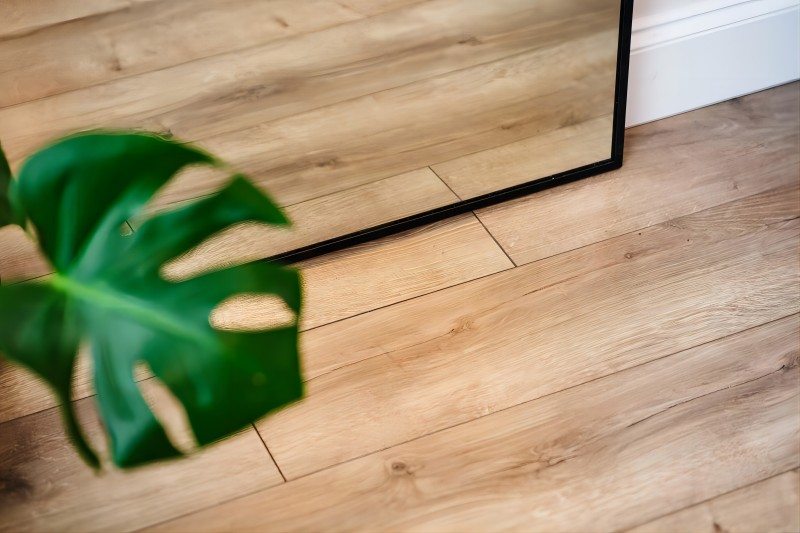
Laminate Flooring
- Material Sources and Sustainability: Often made from a combination of wood fibers, resins, and paper. The sustainability of laminate depends on the source of the wood fibers and the use of recycled materials.
- VOC Emissions and Eco-Friendliness: Volatile organic compounds (VOCs) from adhesives and coatings may be released by some laminate flooring.
- Look for low-VOC or no-VOC options for better eco-friendliness.
Engineered Hardwood Flooring
- Wood Sourcing and Sustainability Practices: Sourced from a variety of wood species; sustainability varies based on the supplier. To ensure responsible sourcing, look for products certified by groups such as the Forest Stewardship Council (FSC).
- Impact on the Environment and Recyclability: Generally better than solid hardwood due to efficient use of wood. Engineered hardwood can be recycled, but disposal practices vary.
Vinyl Plank Flooring
- Environmental Concerns and Sustainability: Composed mainly of PVC, a synthetic substance whose manufacturing and disposal procedures pose environmental issues. The production process can involve harmful chemicals.
- Recyclability and Eco-Friendly Options: Vinyl plank flooring is often not recyclable through standard municipal systems. Nonetheless, certain producers provide environmentally friendly choices that have less of an impact on the environment and are more recyclable.
Choosing the Right Flooring for Your Needs
Room Usage and Traffic Levels
- Laminate Flooring: Its resilience and resistance to scratches make it appropriate for places with heavy traffic. Ideal for living rooms, dining rooms, and certain work settings.
- Engineered Hardwood Flooring: Works well in medium to high-traffic areas. Best for spaces where a classic wood look is desired, such as living rooms and bedrooms. Avoid areas prone to high moisture.
- Vinyl Plank Flooring: Because it is waterproof, it is ideal for high-traffic areas and damp locations like kitchens, bathrooms, and basements.
Aesthetic Preferences and Design Goals
- Laminate Flooring: Offers a wide range of designs and finishes, including wood and stone look, often at a lower cost. Great for achieving various aesthetic goals.
- Engineered Hardwood Flooring: Provides a genuine wood appearance and a wide range of styles and finishes. Perfect for a refined and natural appearance.
- Vinyl Plank Flooring: Comes in a variety of designs and styles, such as authentic stone and wood appearances.
- Suitable for modern and practical design needs.
Budget and Long-Term Investment
- Laminate Flooring: Generally the most affordable option with a lower initial cost. Provides good value for money but may need replacement sooner.
- Engineered Hardwood Flooring: Higher initial cost but a good long-term investment due to its durability and ability to be refinished. Offers properties a substantial value addition.
- Vinyl Plank Flooring: Because of its longevity and minimal upkeep, it has a moderate initial cost and long-term savings. Provides good value over time.
Maintenance and Cleaning Preferences
- Laminate Flooring: Minimal upkeep, only occasional moist mopping and routine cleaning are needed. Steer clear of too much water.
- Engineered Hardwood Flooring: Requires regular sweeping and damp mopping; susceptible to moisture, so maintain proper humidity and clean spills promptly.
- Vinyl Plank Flooring: Very easy maintenance; just need occasional mopping with a light cleanser and routine sweeping. extremely stain and spill-resistant.
Conclusion
Choosing between laminate, engineered hardwood, and vinyl plank flooring depends on budget, foot traffic, moisture exposure, and aesthetic preference. Laminate is cost-effective and durable, engineered hardwood offers an authentic look and refinishing capability, while vinyl plank excels in moisture resistance and durability. Each suits different renovation needs.

